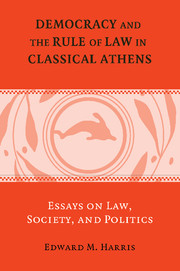Book contents
- Frontmatter
- Contents
- PREFACE
- ACKNOWLEDGMENTS
- ABBREVIATIONS
- INTRODUCTION
- I LAW AND CONSTITUTIONAL HISTORY
- II LAW AND ECONOMY
- III LAW AND THE FAMILY
- IV ASPECTS OF PROCEDURE
- 1 “In the Act” or “Red-Handed”? Apagoge to the Eleven and Furtum Manifestum
- 2 How to Kill in Attic Greek: The Semantics of the Verb (ἀπο)κτείνειν and Their Implications for Athenian Homicide Law
- 3 The Penalty for Frivolous Prosecution in Athenian Law
- V ENVOI
- BIBLIOGRAPHY
- INDEX LOCORUM
- SUBJECT INDEX
2 - How to Kill in Attic Greek: The Semantics of the Verb (ἀπο)κτείνειν and Their Implications for Athenian Homicide Law
Published online by Cambridge University Press: 25 February 2010
- Frontmatter
- Contents
- PREFACE
- ACKNOWLEDGMENTS
- ABBREVIATIONS
- INTRODUCTION
- I LAW AND CONSTITUTIONAL HISTORY
- II LAW AND ECONOMY
- III LAW AND THE FAMILY
- IV ASPECTS OF PROCEDURE
- 1 “In the Act” or “Red-Handed”? Apagoge to the Eleven and Furtum Manifestum
- 2 How to Kill in Attic Greek: The Semantics of the Verb (ἀπο)κτείνειν and Their Implications for Athenian Homicide Law
- 3 The Penalty for Frivolous Prosecution in Athenian Law
- V ENVOI
- BIBLIOGRAPHY
- INDEX LOCORUM
- SUBJECT INDEX
Summary
recently there has been considerable debate among scholars about the jurisdiction of the different courts that tried cases of homicide in Classical Athens. Much of the debate has focused on the distinction between homicide committed by one's own hand (αὐτοχείρ) and homicide accomplished by plotting or planning (βουλεύσας). For instance, Gagarin (1990) argues that it made little or no difference whether the accused had brought about the death of his victim by his own hand or merely by plotting. Thür (1991) and MacDowell (1963), on the other hand, claim that cases where the defendant was accused only of plotting to kill were tried at the Palladion, not at the Areopagus. This chapter will reexamine these issues but will approach the evidence from a different angle. In the past scholars have treated the issue of jurisdiction as essentially a question of procedure. This chapter will begin instead by examining a substantive issue, namely, the semantics of the Attic verb (ἀπο)κτείνειν. A better understanding of the meaning of this word will help to resolve some of the controversies about the jurisdiction of the Areopagus and the Palladion.
The verb (ἀπο)κτείνειν appears to present no problems with translation; as any standard lexicon states, the verb means “to kill” in English, “tuer” in French, “uccidere” in Italian, and “töten” in German. But the verb “to kill” in English is an unusual one. For all transitive verbs such as “to hit,” “to see,” or “to break” there is normally an agent and an object. If John hits Frank, that is, strikes him with his hand, we can immediately say “John hit Frank.”
- Type
- Chapter
- Information
- Democracy and the Rule of Law in Classical AthensEssays on Law, Society, and Politics, pp. 391 - 404Publisher: Cambridge University PressPrint publication year: 2006
- 2
- Cited by



